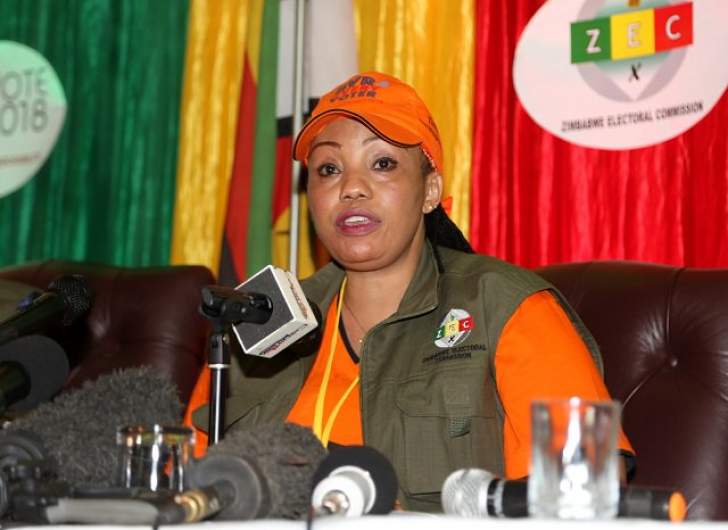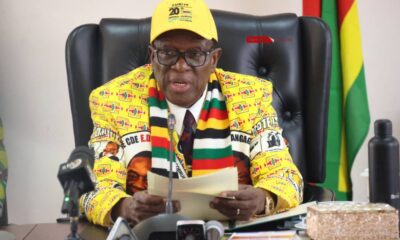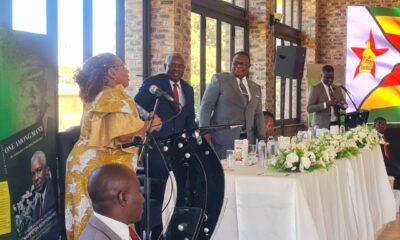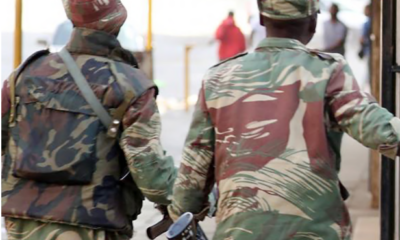
News
Election day was glaringly flawed
Published
1 year agoon
By
NewsHawksSTAKEHOLDERS who spoke to the Southern African Development Community (Sadc) Election Observer Mission pointed out that the 23 and 24 August general elections — which the regional body says failed to adhere to the Electoral Act, Zimbabwean constitution and Sadc Principles and Guidelines Governing Democratic Elections — concluded that the polls were marred by several flaws throughout the electoral cycle.
OWEN GAGARE
The regional observer mission spoke to various stakeholders, including President Emmerson Mnangagwa, Sadc and European Union ambassadors accredited to Zimbabwe, Zimbabwe Electoral Commission (Zec) officials, Zimbabwe Republic Police, as well as leaders or representatives of Zanu PF, CCC, Democratic Union of Zimbabwe and independent candidates.
The mission also met representatives from Zimbabwe Council of Churches, Media Institute of Southern Africa, Zimbabwe Lawyers for Human Rights, Zimbabwe Election Support Network, Women In Law in Southern Africa Group, Crisis in Zimbabwe Coalition and the Attorney-General.
In addition, the Sadc mission met the heads of several international observer missions.
The stakeholders raised a number of issues which compromised the elections ranging from the independence of Zec, gerrymandering during delimitation, the independence of the judiciary, lack of transparency in the design and printing of ballot papers and the uneven playing field, among other issues.
Below are excerpts of key issues raised by the observer mission, which helped the regional bloc to come to the conclusion that the election fell short of constitutional and regional standards:
Independence of Zec
The SEOM noted that the involvement of the public and political parties in the appointment of Zec Commissioners is a commendable practice as it potentially lends credibility to the electoral management body.
However, the SEOM noted some concerns from stakeholders about the actual application of this practice and its effect on the independence of the Zec.
The main concern was that four Zec Commissioners are alleged to be close relatives of high-ranking leaders of Zanu PF, the political party in Government.
Consequently, the stakeholders questioned the impartiality of these four commissioners, whilst others justified the appointment of these four officials on the basis that being a close relative of a person in government or in a political party should not deprive a person of employment opportunities.
The SEOM was, however unable to verify the concerns of the stakeholders but also noted that appointing close relatives of politicians has the potential to affect the independence or the perception of their independence, and compromise the Commission’s impartiality in line with section11(2) of the Electoral Act, and section4.1.9 of the Sadc Principles and Guidelines
Delimitation of constituencies
The Mission was informed that the delimitation exercise that was conducted in 2022 by the Zec was marred with controversy.
In one way or another, concerned stakeholders claimed that the report that Zec submitted failed to observe the constitutional requirements for such an exercise and that there were also divisions amongst the Zec’s commissioners regarding the report’s veracity.
The main allegations against the report were that it constituted gerrymandering and failed to observe the correct methodology for calculating the 20% variance constitutional rule with respect to minimum and maximum sizes of the 210 electoral constituencies.
The courts dismissed legal challenges brought against the Delimitation Report of 2022.
The Mission, however, noted that there remain questions regarding the delimitation exercise for the following reasons:
a) In its Delimitation Report of 2022, Zec rightly states that “the Constitution recognises the impracticability of having equal number of voters in each constituency by allowing the Commission to depart from this requirement within a stipulated margin. In this case, the Constitution in section 161(6) stipulates that . . . no constituency may have more than 20% more fewer registered voters than other such constituencies”.
The constitution in section 161(6) a-f also lists factors that need to be considered when delimiting since they are important during the exercise. However, the Zec goes on to also state that: “Based on the provision of section 161(6) the Zimbabwe Electoral Commission then calculated the 20% deviation from the national average voter registration expected in each constituency which was 27 640”.
This yielded a deviation of 5 528 voters. Since the average number of registered voters was regarded as a stable benchmark against which delimitation of constituencies was conducted, the deviation figure was added to the national average to determine the maximum number of registered voters that a constituency delimited would contain i.e., 33 168.
The Mission noted that the average number of voters per constituency is inconsistent with the provision of section 161(6) of the new Constitution adopted in 2013.
The word “average appears in section 61A (6) of the old Constitution of Zimbabwe under which it was permissible to calculate the minimum and maximum permissible number of voters per constituency by using the national average, the baseline.
The word “average” does not exist as in section 161(6) of the new constitution, which deals with the same subject matter. The difference between section 61A (6) and section 161(6) of the old and the new constitutions, respectively, is far from being merely technical.
In the new constitution, and in the context of section 161(6), the maximum deviation is 20% of the voters registered in the constituencies. The new constitution uses actual constituency by constituency registered voter population, not the national average number of constituency voter population, to calculate the permissible deviation from the requirement that constituencies must have an equal number of voters.
Mathematically, the two methods produce very different results and affect the equality of the vote concerning the elections to parliament.
On the other hand, since the country votes as a single constituency in the presidential election, the difference in the methods has no particular impact on the equality of the vote in that election. It was, therefore not unexpected that Zec would receive substantial criticism on this aspect of its latest Delimitation Report.
The voters’ roll
The SEOM noted the following regarding access to the voters’ roll:
(a) Some stakeholders decried the delay in releasing the voters roll in a searchable and analysable format as the Electoral Act prescribes. Some stakeholders expressed displeasure that the delay in releasing the voters roll resulted in missed opportunities for them to audit the voters roll and therefore give the public confidence about its veracity.
According to the Zec,, however, an opportunity was provided for interested parties to inspect the voter roll as provided by the Electoral Act. The Mission noted that Section 21 (7) of the Electoral Act allows Zec to format the Voters’ Roll to prevent its being altered or otherwise tampered with, and the Commission may impose reasonable conditions on the provision of the roll to prevent it from being used for commercial and other purposes unconnected with an election.
(b) Section 62 of the Constitution of Zimbabwe provides that every Zimbabwean citizen has the right to access any information held by the state or by any institution or agency of government at every level in so far as the information is required in the public interest.
(c) Section 21 of the Electoral Act, “The Commission shall within a reasonable period of time provide any person who requests it, and who pays the prescribed fee, with a copy of any voters roll, including a consolidated roll referred to in section 20(4a), either in printed or in electronic form as the person may request.
(d) Access to the voters’ roll is also premised on the constitutional requirement that the Zec deliver fair elections.
In exercising this function, the Constitution requires the Zec to ensure that those elections are conducted efficiently, freely, fairly, transparently and in accordance with the law. Following consultations with the Zec the Mission was informed of: “The conflict created by the introduction of the Cyber and Data Protection Act, which enjoins all institutions and agencies to protect the privacy of information entrusted to them vis the provisions of section 21 of the Electoral Act where the voters roll although containing the personal information of voters (i.e. names, date of birth, ID Number, Address, Sex) is a public document open to inspection by the public.
Such conflict has resulted in litigation around the voters’ roll, where in one case an Applicant does not want his information public and in yet another the Applicant seeks order directing that the voters’ roll be availed.
(e) The Mission acknowledged the concerns the Zec raised above regarding difficulties in releasing electronic versions of the voters roll. However, the Mission also noted that the law allows the Commission to impose reasonable conditions to prevent the voters’ roll from being used for commercial or other purposes unconnected with an election.
In particular, the Mission noted that section 21 of the Electoral Act provides that “(7) Where voters roll is provided in electronic form in terms of sub-section (3), (4) or (6), its format shall be such as allows its contents to be searched and analysed:
Provided that-
(i) the roll may be formatted so as to prevent its being altered or otherwise tampered with;
(i) the Commission may impose reasonable conditions on the provision of the all to prevent it from being used for commercial or other purposes unconnected with an election.”
(f) Apart from the above safeguard measure against the abuse of the voters roll, there isalso room to note that as a constitutional body, the Zec is obliged to give effect to the Constitution as the supreme law.
In this regard, the requirement for transparent and fair elections, instead of relying on legislation (the Cyber and Data Protection Act) that negates the specific requirement, In addition to the fees levied for access to the printed voters’ roll, the Mission notes that the above scenario restricts access to the voters’ roll by interested persons, including political parties.
Nomination of candidates and fees
The SEOM noted the unprecedented amount of litigation surrounding the elections amongst others, concerning the nomination process of candidates.
In this respect, we further noted the protest and litigation of Saviour Kasukuwere, who believes that he was unfairly disqualified as a presidential candidate; however, the courts dismissed this complaint.
The SEOM further noted stakeholder concerns that nomination fees for a person to stand for election have become too high and restrictive to political participation.
In June, the government, through Statutory Instrument 144 of 2022, increased the presidential nomination fee from 1 000 to 20 000 US dollars. Nomination fees for a constituency election increased from 50 to 1 000 US dollars.
These amounts were also cited as unduly restrictive to less well-off community members, such as women who lack the means. In this context, we also take note of the significance of paragraph 4.1.7 of the Sadc Principles and Guidelines, which requires Member States to guarantee an environment of open contest with no undue exclusion and restrictions on anyone eligible and qualified to stand as candidate in any election.
The SEOM noted that at least two female candidates contesting for the presidency, Elisabeth Valerio and Linda Masarira, encountered difficulties when they attempted to pay their nomination fees when the Nomination Court sat in July 2023.
The two individuals had their nomination papers rejected due to the challenges they encountered with the payment system, which, amongst others, could not accept payment of sums as large as USD 20000.
Whilst Elisabeth Valerio succeeded on appeal to the Electoral Court, Linda Masarira’s appeal was dismissed.
Freedom of assembly
The SEOM noted the concerns emanating from applying the Maintenance of Peace and Order Act (MOPA), which sets out a process for notifying the Zimbabwe Republic
Police of the intention to hold a campaign activity.
In this respect, there were stakeholder concerns about the right to freedom of assembly for election campaign purposes, Whereupon the CCC reported that their rallies were being subjected to unreasonable cancellation by the Zimbabwe Republic Police.
The SEOM also noted that the GEAC Pre-election Report showed. that the ZRP did not permit fourteen CCC public events to proceed between February and March 2023. Engagements with the ZRP also revealed that the police had also not approved some political rallies for the ruling Zanu PF party.
What matters for the elections and the electoral system is that the principle and right of freedom of assembly should be safeguarded in the MOPA.
Notably, the SEAC took this matter seriously in April 2023 and recommended that the ZRP be urged to build confidence amongst all political parties by exercising restraint in rejecting proposed public gatherings for political purposes.
However, the same matter remained a cause for concern when the SEOM deployed in August 2023.
The SEOM also noted reports that there was inconsistent application of the notice period for election campaign gatherings, with certain political parties stating that the ZRP required a seven-day notice instead of the three-day notice that is applicable during election periods following section 7(1)(b)(i) of the Maintenance of Peace and Order Act.
Freedom of expression
The Mission received concerns from several stakeholders that the recent amendment to the Criminal Law (Codification and reform) Act [Chapter 9:23] (No. 23 of 2004) which amendment is commonly referred to as the Patriot Act has allegedly resulted in a severe restriction of the freedom of expression which is guaranteed by section 61(1) of the Constitution.
The Patriot Act creates the offence of “wilfully injuring the sovereignty and national interest of Zimbabwe”.
Stakeholders were particularly concerned that this offence is vague, too general, and it criminalises “any communication between two or more persons, whether happening in person or virtually or by a combination of both, which involves, or is facilitated or convened by, a foreign government or any of its agents, proxies or entities.
Of note was also the concern that even the consultations between these stakeholders and international observation missions could fall afoul of this law. The SEOM long-term observers (LTOs) who were deployed in Harare, Chitungwiza, and surrounding areas such as Marondera encountered this challenge directly in their post-election observations.
Individuals that the LTOs attempted to engage to assess the post-election environment were mostly reluctant to talk to observers citing the potential to be arrested under the “Patriot Act”.
7.6.3 In this regard, the SEOM noted that the Patriot Act is incompatible with the spirit of section 61(1) of the Constitution, and paragraph 4.1.2 and 5.1.10 of the Sadc Principles and Guidelines Governing Democratic Elections, which requires Member States to uphold, amongst others, the freedom of expression freedom of association.
The right of every Zimbabwean to freedom of association is provided for under
Section 58(1) of the Constitution. Section 4.1.2 of the Sadc Principles and Guidelines requires Member States to uphold, amongst others the freedom of association.
However, a number of stakeholders, particularly from civil society sector expressed their discomfort regarding the Private Voluntary Organisation Bill.
Their concern was that the Bill restricts the space of Civil Society Organisations and does not recognise organisations registered as trusts and associations. The stakeholders were concerned that if passed into law, all the existing organisations will be rendered illegal and. will need to be re-registered in accordance with the new law.
Participation of women as candidates
Stakeholders that also included political parties acknowledged the significance of Section 80 of the Constitution and the Sadc Protocol on Gender and Development, which require that women be given equal opportunities as men in political, social and economic activities.
Despite Zimbabwe’s innovations, such as the provision of the 30% female quota in respect of councillors for local authorities, the Mission noted that a lot more still needs to be done to achieve gender parity in contested/elected political positions.
In this regard our Mission was advised that in 2023 fewer women succeeded at their parties’ primary elections, and fewer women stood for the National Assembly, whilst only one woman stood for the presidency. Amongst others, this could also be attributed to the high nomination fees.
Independence of the judiciary
In view of their significance in the event of legal challenges in the electoral process, some stakeholders expressed the view that the Government compromises the judiciary. A key justification for this perception was information received from these stakeholders that the judiciary recently received large financial and material incentives, which the stakeholders viewed as an attempt by the Government to buy the loyalty and allegiance of the judiciary.
Alleged intimidation of voters
The SEOM was informed that the rural vote may be compromised by alleged intimidation attributed to a group called Forever Associates Zimbabwe (Faz), which is said to be a quasi-security intelligence organisation. The group was said to have been deployed to wards and around 30 000 villages. The allegations were that people were intimidated to vote in a particular manner and were warned that it would be easy to determine who voted against certain parties.
The SEOM noted that at the beginning of its Mission, the existence of this group could not be verified as authorities that were requested to comment on the Faz professed ignorance of its existence. However, the group was acknowledged after the elections
Postal voting controversy
There was considerable concern from stakeholders that postal voting by the officers of the Zimbabwe Republic Police was compromised by the alleged coerced voting. There were allegations that police officers undertaking postal voting were coerced to vote in a particular way in the presence of their supervisors, thus compromising the secrecy of the vote.
Coverage by state-owned media
It was the contention of several stakeholders that the State-owned media housesremain biased against the opposition political parties and candidates. While the Mission noted some improvement compared to the 2018 electoral processes we also noted that the content of the public broadcaster and the State-owned newspapers were in favour of one political party, contrary to Section 61(4) of the Constitution, which requires State-owned media to be impartial, and section 4.1.6 the Sadc Principles and Guidelines which requires State-owned media to give equal opportunities for all candidates and political parties.
Lack of diaspora voting
Stakeholders expressed frustration on at the alleged disfranchisement of the citizens due to lack of diaspora voting. They emphasised the need to make provision for diaspora voting and the frustration emanated from the continuous requests for same in the previous elections.
The SEOM acknowledges that the laws of Zimbabwe do not make provision for diaspora voting, and previous court rulings have confirmed that Zec is not obligated to facilitate voting by the diaspora. The SEOM takes note of section 4.1.8 of the Sadc Principles and Guidelines, which encourages regular reviews of the participation of citizens in the diaspora in national elections.
Alleged lack of transparency in the procurement and printing of the ballot papers Section 239(g) of the Constitution gives Zec the mandate to design the ballot paper.
The Mission noted that Section 239 (a)(iv) of the Constitution also requires that elections be conducted transparently in accordance with the law. In the spirit of transparency, stakeholders were of the view that they should have been provided with information on the procurement of the printing of ballot papers earlier than the time the Zec released this information.
The stakeholders added that they were not provided with information regarding the company that was contracted to print the ballot papers early into the process. They also were concerned about their lack of awareness of the ballot paper design that would be used during the elections
Polling stations
The Stakeholders raised concerns about the delay in informing the public about the number and places of polling stations, fearing possible confusion and low voter turnout during polling day.
You may like
-


War vets oppose ED2030 campaign
-


How Bonyongwe navigated coup as Mugabe was toppled
-


Mnangagwa congratulates Frelimo for resounding victory before official announcement of Mozambique elections results
-


Political parties should register: ZEC
-


Military a stumbling block to Mnangagwa manoeuvre
-


Venezuelan Stolen Presidential Election








